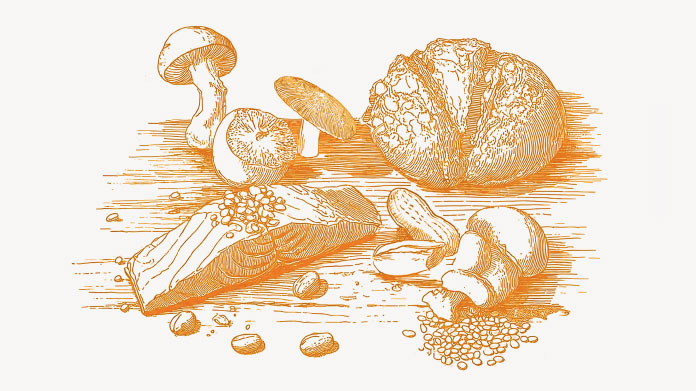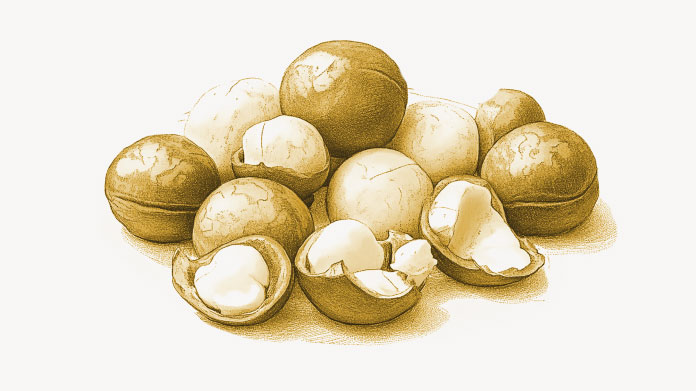
Coriander and digestion
Anaromatic herb with a strong, distinctive flavour, coriander is widely used in Asia, in India and the East.
A few, finely-chopped coriander leaves add an intense, exotic flavour, perfect for spicing up a tagine or a goat’s cheese-based dish!
In terms of composition, coriander contains a high concentration of vitamin K, and with its anti-spasmodic properties, supports a healthy digestive system (1).
The action of thyme
A symbol of Provence, like rosemary and lavender, thyme is a highly-fragrant and perennial dwarf shrub.
In ancient Egypt, it was used in religious rituals, while in Rome, thyme was predominantly recognised for its purifying and repellent action.
Nowadays, thyme is one of our most popular culinary herbs, especially for flavouring summer meat dishes and barbecued food. It is the leaves of the plant which are normally used and which can also be found in the form of an essential oil.
Instant relaxation with basil
Like thyme and oregano, basil (Ocimum basicilicum) is part of the Lamiaceae family.
In pesto, antipasti... basil brings an Italian or Mediterranean touch to all kinds of recipes. It also supports digestive health and promotes relaxation (2).
Its close relative holy basil (Ocimum tenuiflorum or Ocimum sanctum), also known as tulsi, supports respiratory health, immunity, vitality and physical and mental well-being. To benefit from its properties, choose a formulation such as Adrenal Support (with a high tulsi content) or Adaptogenic Potion (which also contains a number of other adaptogen plants).
Nutrient-rich chives
Originating from the East, specifically Siberia, chives are one of the easiest plants to grow and eat.
Part of the same family as garlic, they’re perfect for seasoning crudités, salads and sauces.
Low in calories, they contain vitamin C with antioxidant properties, and good levels of vitamin K, which supports healthy blood and bones.
Mint and respiratory health
A star of the herb world, perennially associated with summer, mint, like rosemary, comes in several varieties: spearmint, peppermint, Moroccan mint …
It was used in ancient Egypt and Greece for helping to soothe intestinal problems.
Peppermint is the variety used most widely in phytotherapy. A hybrid of spearmint and water mint, it is mainly known for its soothing effect on the mouth and throat, its benefits for respiratory health and its antispasmodic properties. You can find peppermint in certain synergistic formulations (such as Organic Defense Mix and Digestive Enzymes).
The powers of chervil
A plant native to southern Russia, we have the Romans to thank for bringing chervil to Northern Europe.
In the Middle Ages, chervil leaves were used for their appetite-stimulating and diuretic (urine-increasing) properties.
Composition-wise, chervil contains vitamin C, provitamin A and vitamin B9, as well as numerous minerals and trace-elements. It supports digestion by stimulating stomach and gut secretions. It is used raw in recipes as it loses its taste when cooked.
Parsley, a much-loved herb
First consumed more than 5000 years ago, parsley is undoubtedly one of the most widely-used aromatic herbs in the world.
Very easy to grow, parsley contains iron, vitamins C and K as well as potassium.
Considered sacred by the Greeks, it is widely used in cooking to flavour sauces, mayonnaise and stock. It can also be consumed as a dietary supplement alongside other active ingredients with similar properties (it features, for example, in Alkaline Formula, a supplement rich in alkaline compounds).
Dill, for digestion and sleep
Dill is an excellent herb for adding flavour to soft cheeses, sauces, as well as salmon, potatoes and crudités.
A source of antioxidants, it also contains potassium and vitamin C.
Used for centuries as a medicinal plant, dill was mainly consumed as an intestinal antiseptic decoction. Its benefits for digestion, as well as relaxation sleep, and lactation , are still recognised today ...
Oregano, a medicinal plant packed with benefits
An essential herb for flavouring pizzas, oregano is widely found in the Mediterranean region, as well as in Asia and North America.
In ancient Greece and Rome, it was often used as a perfume, and was thought to have a purifying and preserving effect. Oregano contains a number of aromatic molecules including terpenes (3). It supports mental performance and promotes good gastrointestinal, cardiovascular, liver and immune health.
To increase your intake, choose a dietary supplement (such as Oil of Oregano, a potent essential oil of oregano).
Improve your breathing with sage
A medicinal plant in common use in the Middle Ages as it is today, salvia officinalis or sage, is a popular cooking ingredient for flavouring meat, stock and marinades.
Whether in an infusion, decoction or ointment, sage offers many health benefits too, particularly antiseptic properties.
It also helps maintain good digestive and respiratory health, as well as general well-being during the menopause.
The secrets of rosemary
Another Mediterranean plant, rosemary comes in several varieties, all of which have their individual composition and properties.
It is the plant’s leaves and flowering tops which are predominantly used in cooking, aromatherapy and phytotherapy. Rosemary contains flavonoids, phenolic acid and multiple aromatic molecules such as camphor and cineole, depending on the variety (4).
It can be consumed as an infusion or as a dietary supplement (such as Ursolic Acid, an excellent extract of rosemary leaf).
Lavender, a heady, soothing plant
Like rosemary, mint and thyme, lavender also comes in several varieties.
The ultimate symbol of Provence, lavender was made popular by the town of Grasse and the rise of master-perfumiers in the 18th century.
Though it is primarily used for its sweet, floral perfume, lavender is also known for its medicinal properties. In infusions or as an ingredient in ointments and balms, it promotes relaxation and drowsiness(5).
Lemongrass and its alcohols
Used for its mosquito-repellent properties, lemongrass is also popular as an aromatic herb in cooking.
There’s nothing better for adding an exotic, citrussy and mild, spicy tang to Asian dishes!
Lemongrass exists in various forms depending on where it’s grown: Java, Sri Lanka or India. It contains a number of aromatic molecules, including monoterpene alcohols with antiseptic properties.
The virtues of aniseed
With its distinctive and somewhat polarising flavour, anise or aniseed (Pimpinella anisum) is thought to have been in use as far back as the 6th century BC, and was also popular in ancient Rome.
In cooking, aniseed adds a flavour similar to liquorice, fennel or star anise to biscuits, meat or fish.
Composition-wise, aniseed contains sesquiterpenes, phenolic acid and essential oil. It supports respiratory and digestive health.
References
- Medicinal benefits of coriander (Coriandrum Sativum L) - U. Rajeshwari, B. Andallu
Published 2011 BiologySpatula DD - Peer Reviewed Journal on Complementary Medicine and Drug Discovery - DOI:10.5455/SPATULA.20110106123153 Corpus ID: 86309875 - Vasorelaxant and anti-platelet aggregation effects of aqueous Ocimum basilicum extract - Journal of Ethnopharmacology - Volume 125, Issue 1, 17 August 2009, Pages 157-162
- Composition and Antimicrobial Activity of the Essential Oils of Two Origanum Species
Aligiannis, E. Kalpoutzakis, Sofia Mitaku, and Ioanna B. Chinou - Journal of Agricultural and Food Chemistry 2001 49 (9), 4168-4170 DOI: 10.1021/jf001494m - Effects of in vitro gastrointestinal digestion and colonic fermentation on a rosemary (Rosmarinus officinalis L) extract rich in rosmarinic acid - Food Chemistry
Volume 271, 15 January 2019, Pages 393-400 - Effects of Lavandula angustifolia Aroma on Electroencephalograms in Female Adults with Sleep Disorders - Journal of Life Science (생명과학회지) - Volume 22 Issue 2 / Pages.192-199 / 2012 / 1225-9918(pISSN) / 2287-3406(eISSN)
5 Days
Delivery is prompt and I never saw a…
Delivery is prompt and I never saw a quality problem with the manufacturing. It is not possible to assess efficacy on a personal basis, since too many factors come into play. Efficacy can only be assessed statistically with a sufficient number of cases.
Roger De Backer
6 Days
I collaborates with the Supersmart…
I collaborates with the Supersmart more than 10 years. Every thing is going good. Quality of the things is good. Delivery comes in time. Five stars definitely !!!
Oleksiy
6 Days
All good
Simple, frictionless site, easy ordering, good delivery updates and execution.
Chris Robbins
8 Days
I feel better
I feel better
Peter Ammann
9 Days
Prompt delivery
Prompt delivery
JAKUB Radisch
10 Days
My new go-to for top quality supplements!
I am buying more and more of my supplements from this superb, high quality company. Cannot recommend it enough. Plus, excellent customer service with a quick, helpful team and speedy deliveries. Highly recommend Supersmart!
Cecilie H.
13 Days
SUPERSMART WHAT ELSE👍
SUPERSMART WHAT ELSE👍
DIEDERLE Christophe
16 Days
Excellent quality products with…
Excellent quality products with innovative formulas, as someone who has been suffering with acid reflux, these supplements have been lifesavers.
Oriana Moniz
17 Days
high quality supplement!
high quality supplement!
GALANT
17 Days
Good service prompt delivery
Good service prompt delivery
Mrs Marcella Reeves
22 Days
I like your clear explanation
I like your clear explanation. And how to make a choice of products for a specific health problem
Ingrid
28 Days
Great product and it arrives quickly.
Great product and it arrives quickly.
SOMMARIVA Gianni
30 Days
Excellent products and fast service.
Excellent products and fast service. What do we need more?
Margarida
34 Days
The variety of products is amazing
The variety of products is amazing, the offers are good and the sending is very fast. I just miss having a bit more of guidance about combinations, possible interactions, etc.
Maria Angeles Verdu
35 Days
It was quick
It was quick.
Timo Antero





